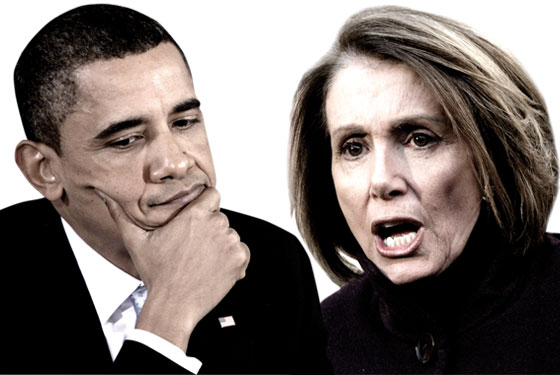
So what did we learn from the seven hours of speechifying that constituted the much-ballyhooed health-care summit? First, that Barack Obama was the smartest guy in the room—and occasionally can’t help showing that he knows it. Second, that congressional Democratic leaders suffer immeasurably by comparison to the president. (Harry, Nancy, I’m looking at you.) Third, that the representatives of neither party were remotely interested in putting aside their tired talking points long enough to have an actual, ahem, conversation. Fourth, that John McCain remains as fabulously, irrepressibly cranky as ever. And finally, that the congressional GOP is capable of putting a calm and non-crazy face on its steadfast intransigence.
As a political matter, this last point may have mattered most of all. To no small extent, the health-care summit was intended to expose the Republicans’ recalcitrance and make them pay for it. To make them appear utterly unreasonable and, ideally, quite loony. But at Blair House, they managed to avoid howling at the moon. There was no talk of death panels, socialism, or government takeovers. Instead, what Republicans put forth were a passel of fairly wonky arguments about insurance premiums, regulatory overreach, and the advantages of incrementalism over comprehensiveness.
Though Obama chastised his opponents for sticking to their scripts, he gave considerable credence to the notion that the argument over health-care reform was rooted in principles held deeply by each side, calling their disagreements “legitimate,” “honest,” and “philosophical.” Of the competing plans on the table, the president added, “Neither of these proposals is radical. The question is which one works best.”
This approach was perfectly consistent with Obama’s political temperament and reflective of his ever-conciliatory rhetorical tendencies. The problem, however, was that it didn’t provide a template for how skittish Democrats might defend a vote in favor of a piece of legislation that remains worryingly unpopular, especially with independents—and therefore provided no reassurance that ramming it through with a narrow party-line majority won’t be the kiss of death come November.
For many Democrats, of course, the prevailing calculation is that whatever risks are entailed in passing the bill, the risks of failure are even higher. That the appearance of impotence will be even more damaging than the appearance of hard-core partisanship. And, no doubt, there’s a strong case to be made that this is true. But it’s not those who have embraced this analysis that the White House has to worry about. Instead, the cause for concern is the handful of Democrats who see themselves as especially vulnerable electorally.
Thus the drama that’s about to unfold over the coming days. By every vote count I’m aware of, Nancy Pelosi is at least a few short—and perhaps as many as a dozen—of the 217 she needs to pass the Senate version of the bill, complete with the “Cornhusker Kickback,” the “Louisiana Purchase,” and all the other abominations attached to it. And no one is sure whether Harry Reid has the 50 required to pass the fixes to the bill necessary to appease the House by means of reconciliation.
What the wavering congresspeople in the middle of the ideological spectrum hoped the health-care summit would achieve was a new political dynamic that would make them feel a little safer. What they got instead was the status quo ante, along with a reminder from the president that if Democrats go it alone, voters will have the final say over whether they were wise to do so. “That’s what elections are for,” he said—which is exactly why so many of his allies are trembling in their loafers right now.
Have good intel? Send tips to [email protected].